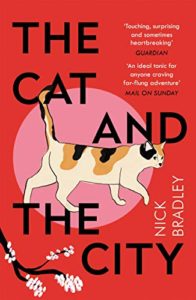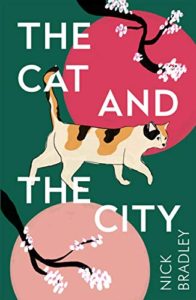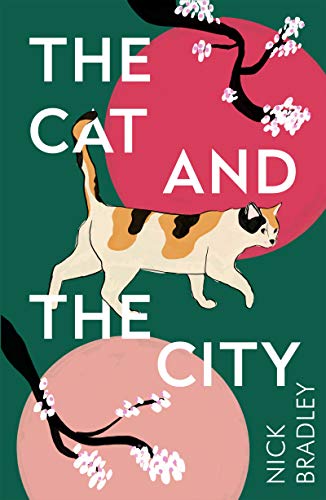Interview by Susan Karen Burton
I first encountered Nick Bradley in the University of East Anglia campus pub in 2015. We were both studying creative writing and a lecturer had suggested we meet because our area of interest—Japan—was, he stated, somewhat specialized. It was felt that we could use each other’s support.
He was right. At our first meeting Nick was feeling disgruntled. He had just workshopped a new chapter and had been ‘critiqued’ for placing a Japanese elementary schoolboy on a subway train alone. That was implausible, the other students had decided. This raises two issues for an author writing about a foreign culture. Firstly, that they may have their expertise questioned in a way that a native author will not. Secondly, that they may face challenges in describing an alien culture to readers who may never have visited but who may hold definite views and expectations of it. We discussed these and other topics after the publication of his debut novel, The Cat and The City.
SKB: The Cat and The City is a series of interconnected short stories about an odd assortment of people living their day-to-day lives in Tokyo and observed in a variety of ways by a stray cat. What was the thinking behind that?
Bradley: In an abstract way, the book is about connections, relationships, family and duty. For me, the whole idea of having a connected novel which shows how disparate characters brush up against each other is linked to the idea of connection itself, and how some families or friendships can fall apart while others stay together.
SKB: Was it important that the book is set in Japan?
Bradley: It wasn’t that the book had to be set in Japan, I suppose it was set in Japan because of my life experience. I think it could have been set elsewhere, in another city. But one of the ideas that kickstarted the book was that when I was living in Tokyo and commuting the same route every day, I would see the same people and I would often wonder about their backstories, their lives, and where they were going. And on a day when I didn’t see one of them, I would wonder what had happened to them. And when I stopped commuting, I often wondered whether any of those people who used to see me every day would think, ‘Oh, where’s that foreign guy who used to walk down this road every day at this time?’ I think that was the beginning of the idea of connections that drives the novel. I suppose if I were to link it to Japan it would be the idea of en [縁] as in ‘connection’ or ‘fate.’ The book does tie in with concepts in Japan but then I think a lot of things examined in it are universal.
SKB: You lived in Japan for many years. When did you first arrive and why did you choose Japan?
Bradley: I first moved to Japan in the mid-2000s on the Japan Exchange and Teaching Programme (JET) after I’d completed a master’s degree in English literature at Oxford University. I was based in Hiroshima prefecture in a small fishing town called Itozaki. Early on in JET, a group of guys went out to an izakaya, mostly Americans and a couple of British and Australians. We were all sitting round the table and someone asked the question, “Why did you come to Japan?” I said I didn’t know anything about Japan but I came here because I wanted to be a writer. And that kind of started a domino effect where everyone at the table said, “I want to be a writer, I want to be a writer.” It was about eight guys and all of us were closet writers.
SKB: What is the attraction of Japan for potential novelists?

Bradley: In my case, I think I would have gone anywhere in the world. I wanted to go anywhere different or anywhere that I thought was going to be different. It doesn’t surprise me that people who want to write are the same sort of people who will drop everything and leave their lives and go somewhere new. It is probably the desire to experience life and to see things from a different perspective. When you think about writing fiction, it is the act of trying to empathize with a different perspective to your own. That’s the very nature of novelistic writing, trying to create characters who are different to the way that you personally think and feel. So it would be natural that in order to get that empathy you would try to maneuver yourself in the world, to see different things and to speak to different kinds of people.
SKB: You were on the JET Program for four years and you became fluent in Japanese. That led to you becoming a translator for Honda in the UK and then Nintendo in Germany. And then you returned to Japan to work for JTB. Where did you begin writing The Cat and the City?
To be really specific it was in 2015 just after I’d had my first workshop on the MA. But ever since I was in my teens I was constantly having an idea for a novel. I would start it and I would get about 20,000 words in and I would just stop. I had so many false starts. For my first workshop at UEA I presented something completely mad and different which was a science-fiction cult story that wasn’t set in Japan. And then I wanted to write a short story about going to a festival (‘Omatsuri’ in The Cat and The City) and the cat was an integral part of it. After I’d written it I thought I could do lots of these and I could connect them all. So that was the beginning of The Cat and The City.
SKB: I’m surprised. Wouldn’t you have found it easier to write it in Japan?
Bradley: I found it much easier to write about Japan having left the country. I worked on a couple of novels when I was living in Tokyo and I sent one to a friend who had never even visited but she said, “It just doesn’t feel like Japan.” The problem with that particular book was that I was trying to write a novel about a foreigner who lives in Japan but everything seems normal to him. I realized that wasn’t going to work for English-speaking readers. I found that the stuff I wrote in Japan was a bit mundane, a bit boring. When I came on the MA I didn’t want to write about Japan but, funnily enough, I think a homesickness for Japan kicked in and I started to really miss lots of things about the place. And I think that helped me to write the book because my memories were coming back to me like mad. I was thinking about all these things that I used to do and that spurred on the direction of the book.
SKB: I recall you had some problems workshopping some of those early chapters.
Bradley: Some of the things that are realistic about Japan, people in the UK didn’t believe them. The perfect example of that was the idea of a Tokyo elementary school kid riding the subway. But that’s completely normal and people who’ve lived in Japan or been there will have seen it and would understand that. But some of the very mundane elements of the books, people would question. I don’t know if they were questioning my knowledge of Japan or just the realism of a young boy taking the subway by himself. I don’t blame the people workshopping the piece – they meant well and were asking great questions. But at times it felt hard trying to convince people of what Japan is really like.
SKB: This must have made you realize that some western readers may not know so much about Japanese culture. Did this affect how you wrote the book? And your idea of who you were writing it for?
Bradley: Yes, completely. But ironically, this also ended up being the kind of motivating factor for writing the book. I started to think that there was a real need to write a book which portrayed the Tokyo I knew – the outsider’s view of the society, from the inside. Like the cat in my book I spent a lot of time viewing Japanese companies, culture, and society from the inside. I often felt an affinity towards the cats who silently watched the goings on of the big city. I love reading Japanese literature, and I read a great deal of it, but I always get a sense that Japanese writers ignore what to them is mundane, but to non-Japanese people is extremely interesting. So I can say for sure that I wrote this book not just for those non-Japanese who are already familiar with the country but also as a kind of gateway drug for non-Japanese who are interested in getting to know the country (and its literature) better.
SKB: Is there any advantage to writing about Japan as a foreigner?

Bradley: I think Japanese writers have to be careful about what they say because they’ll be criticized for certain things. In my position I can write about certain elements without any fear of criticism. For example, the book Tokyo Ueno Station which is about a homeless guy living in Ueno Park in the lead up to the Olympics, I don’t think it’s surprising that the person who wrote that was Yu Miri who is a Zainichi Korean. I think she’s already a marginalized person in Japan and that affords her a slight freedom because she can write about grittier or darker elements of Japanese society without fear of being criticized.
I have freedom in being a non-Japanese writer writing about Japan that is not afforded to a lot of Japanese writers who have to be far subtler than I am. I was quite heavy handed with some of the things that I was writing about. Natsume Sōseki’s I am a Cat is subtle because the criticism of Meiji society comes from a comical cat and it’s very difficult to get angry with this cat. I think Sōseki was very clever to use this cat as a kawaii decoy who you can’t get angry at, even though the cat is making fun of people and being silly itself.
SKB: In what ways has living in Japan affected your writing style?
Bradley: Before I moved to Japan I think my writing style was convoluted and overly complicated. I don’t know how much of that was due to the fact that I was a brash dude in his early twenties but one thing Japan did for me was it simplified my sentences when I was writing prose. For which I am ever in its debt. I think the act of having to learn Japanese from scratch and being forced to work with a limited vocabulary but learning to use it effectively, that actually helped me with my writing. Because it started to make me think that simplicity is sometimes the best way to convey powerful emotions. The act of writing fiction is not necessarily the display of a prolix style. It’s trying to convey emotions through simple language. And I think the act of moving to Japan and learning Japanese taught me that skill in writing.
SKB: Most of the characters in your novel are Japanese. In what language did you hear them speak?
Bradley: My characters very much spoke to me in Japanese and I translated what they were saying into English. In earlier works, I translated to a more literal extent but for this I tried to make it sound like a more natural translation. Certain characters I would translate into American English and others into British English. So even though their dialogue was based in Japanese I was creatively translating it into the ‘feel’ that I wanted it to have. Post-Second World War, the American influence on Japan has been massive and the English that students learn in schools is American English. You only have to read a Murakami novel to get a sense of that American influence. So for the office worker in my ‘Street Fighter II’ story, an American English accent suits him better because he is a young guy and contemporary Japan has more in common with America than it does with Britain. The detective, Ishikawa, I wanted him to sound like a ‘Chandleresque’, hard-boiled detective, so obviously American English worked better for that too. Other characters spoke with a British accent. It suited them to be more British and old-fashioned. So the homeless guy, Ohashi, I translated his Japanese in my head into a British accent.
SKB: There are a lot of Japanese words in there too. How did you decide which words to translate and which words to keep in Japanese?
Bradley: I did have rule for myself that, other than the Japanese dialogue, any Japanese words that I’ve used, if someone were to go to Wikipedia and type those words in there would be a thorough entry in English which would explain that word or concept to them.
SKB: Halfway through the novel a manga cartoon appears. What was the thinking behind that?
Bradley: I wrote this story where it cut to dialogue only and then, after workshopping the piece, I started to think about how that dialogue could go straight into a manga. And it was one of the most satisfying things. It was quite tough, the collaboration process, but I’m really happy with how it came out. Mariko Aruga is a British-Japanese illustrator with a nice fusion of British and Japanese sensibilities in art. One of the things I like about her work is that it has a quirky crossover feel, that looks like it could have been drawn by a very talented child. [In the story ‘Hikikomoro, Futoko and Neko’, the manga is meant to be the work of Kensuke, a high school student.]
SKB: Why are all the stories connected by a cat?
Bradley: In the western parts of Tokyo where I lived, every time I tried to write a street scene there was always a cat in it. And in all the photos I used to take of those neighborhoods there were always cats. The number of stray cats in Tokyo made it impossible to not put a cat in there. There were so many of them roaming the alleyways.
But also, all the Japanese literature that I have been reading ever since I moved to Japan in 2006, so much of it has cats in it or cats who are a key theme. So it was the reality of Tokyo and how many cats there are, plus an established convention in Japanese literature that involves cats.
And then the reason I thought cats were good was because I think—and lots of animal theorists have said this—animals tend to provide a mirror or reflection of humans. So especially for writers, when you write in a cat you’re really mirroring the interiority of the characters in your book. Characters express their inner feelings through their attitude towards the cat. So the cat becomes a living, silent set of eyes that can go anywhere and see anything and can be party to all these dramas but it’s not really taking part in them. It’s like a third person narrator.
SKB: Why is your cat a calico cat?
Bradley: The narrator of Sōseki’s I am a Cat is a ‘mike neko’ [三毛猫] which translates as tortoiseshell or calico, so I wanted to make my cat calico as a nod to Sōseki.
SKB: Will your next novel be set in Japan?
Bradley: I think I might be one of those writers who doesn’t like to talk about their next project, so I’ll keep quiet about this one for now. All I will say is that having finished my PhD, I’m glad I can immerse myself in writing fiction again. It really brings me so much pleasure.
The Cat and the City (Atlantic Books, May, 2020) is available in hardback and e-book versions. The paperback will be out in Japan in August, 2021.
About the Author:
About the Interviewer:
Visit Dr. Susan Karen Burton’s website or follow her on Twitter (@drskburton)


